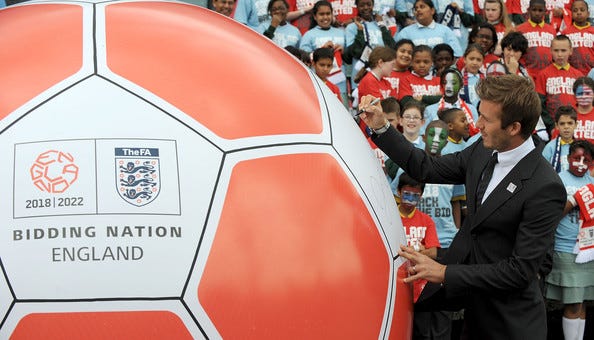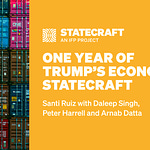This is the second installment in a new Statecraft series: we’re calling it our across-the-pond edition. Intermittently over the next few months, we’ll be sharing interviews with British civil servants, policy makers, and iconoclasts. Don’t worry: we’re not giving up our focus on American institutions. But we think comparing and contrasting with our counterparts over there can help us better understand the policy environment over here.
The first installment, with Boris Johnson’s science and tech adviser, is here:
Today’s interviewee, Jonathan Luff, was a British diplomat for more than a decade, and worked on the British bid for the 2018 World Cup in the Prime Minister’s office.
We discussed:
How do you bid for the World Cup?
Was the UK too naive to win a bid?
Does British soft power still matter?
What are the bottlenecks to British economic growth?
Can Britain do strategic deterrence with limited resources?
How do British diplomats and American diplomats differ?
Was Cameron’s foreign policy all a mistake?
For a printable transcript of this interview, click here:
Tell me about your involvement with the 2018 World Cup bid.
The 2018 World Cup bid was how I ended up working for the Prime Minister and spending a little over two years at Number 10. By that point I’d been in the Foreign Office for over a decade — I'd spent probably half of my time on postings overseas and the rest back in London.
Where overseas?
Largely in the Middle East. I'm a Foreign Office Arabist, so I spent time in Egypt, then Saudi Arabia, and then in Iraq during the conflict in 2003. In 2005, I landed at the embassy in Paris and spent three and a half years there, and then came back to London to lead a team in the Middle East department at the Foreign Office.
I'd been doing that for a little while when a great friend of mine who was, at that time, the Prime Minister's Private Secretary for Foreign Affairs asked me to lunch to talk about a project that was outside of his normal scope. That project was overseeing the final stages of the bid for the 2018 World Cup. This was the last six weeks of the bid at the end of 2010 and a huge amount of work had already been done.
Was that friend Tom Fletcher?
Yes, Tom Fletcher was the private secretary. He and I had been colleagues at the embassy in Paris, and then he was a private secretary for Brown throughout his time as Prime Minister, and then he transitioned to Prime Minister Cameron's office. It was about six months into that that we had lunch and I ended up accepting this short-term special project to help with the World Cup.
On a bureaucratic level, how does somebody from the Foreign Service end up in the equivalent of the White House on a special project? That seems like a fast and loose way to bring on talent.
Yeah, I think it was unusual. That’s not the way recruitment typically happens across the civil service, but every now and then there are exceptions. This was one of those moments — Tom didn’t have the bandwidth because he was due to hand over to John Casson, the incoming private secretary, and I think Tom had a G7 or G20 or some other major foreign policy issue to deal with.
And, frankly, the bid for the World Cup, though iconic and important, was not at the top of his list of priorities. But the Prime Minister had made it a personal priority and had committed to being as supportive as he could be in the final stages. The bid had been going on for a couple of years, so it predated his time in office; he was really just seeing it through to the conclusion, but he really wanted it to happen. Everybody really wanted it to happen. A World Cup is like an Olympics, it's a remarkable festival. Fletcher said he would do all that he could, and he wanted somebody to give it their full attention, so there wasn't time for a formal process or standard bureaucratic procedure.
You had this long-standing professional relationship with Fletcher, but why else were you brought in? Did you have special expertise that was needed in those last six weeks?
Tom knew me personally and knew that I had a can-do attitude and would cope with being thrown into somewhat of a deep end. He needed someone to immediately pick up that project and work closely with the Prime Minister himself and the senior team and not be phased by it. He also knew I was, and still am, a sports nut, which I think helped.
Who's your team?
My team is Newcastle United, which is another interesting topic [in 2021, the Saudi Public Investment Fund purchased an 80% stake in Newcastle]. I'm a bit have-my-cake-and-eat-it in this respect: my hometown team is Bristol City. I still have a very soft spot for them and always will, but I went to university in Newcastle and was a fan of Kevin Keegan's Newcastle team in the late ‘80s and early ‘90s. I've been a loyal Newcastle fan ever since. Not that it's done us much good.
Things may be changing! But tell me how a World Cup bid works.
Well, that one was peculiar. Many of the things that have since happened to reform FIFA and the process were the result of the design of that bidding process. You really couldn't have come up with a bidding process more likely to encourage horse-trading and poor behavior among participants and voting members of the Executive Committee (ExCom).
I'm not an expert on sports bidding processes in general, but the idea is that you submit a formal candidacy and form a team to represent the bid. The England 2018 bid team included people from the Football Association (FA), the Premier League, and some of the top clubs from other sporting organizations, and some media and campaigning experts. That team has the mandate to make and lead the bid.
If you're successful, there are going to be costs that might fall to the government, like policing, transport, infrastructure, and stadium construction. So the government has to stand behind the bid, but it doesn’t run it.

If I remember correctly, Prince William was the on-paper chairman of the bid, right? So there's a real face to it.
I think he was the President of the FA at the time.

Ah, that’s right. But just to say for our readers, the government is not necessarily actively involved in the bid, but there's public support for it.
Yeah, I think bidding has certain requirements for government support to give it credibility; both the government of the day and the government of the year in which the World Cup will actually take place must commit to supporting it. The UK and England had a very strong bid on that front, and they'd learned from a previous bid that had gone badly. The criticism of that previous failed bid was that they'd been very arrogant, so the 2018 team tried to adapt their tone and be more low-key.
Was that arrogance in personal interactions with FIFA?
This is going back to the 2006 World Cup that Germany ultimately hosted. People on that team said there'd been a lot of criticism of that previous bid for being arrogant and almost believing that they had some right to host a World Cup — that had put people off and was one of the reasons that they were unsuccessful. The 2018 team tried to be humble and open and prepare a bid that could win on its merits. It was a very strong bid: it had full government support, all of the top Premier League teams behind it, a great set of host cities, and a great message. It had a genuine legacy component to it and communicated the values of sport.
Tell me just a little bit more about your involvement over that month and a half. What were you doing to shepherd that bid to completion?
At that point, it was just diplomacy. You're trying to understand who your supporters are and work out where your strengths are. And it was four-dimensional because the 2018 and 2022 bids were happening concurrently, so you didn't have just five nations or consortia bidding for one World Cup, but ten. You could bid for one or both, and you’re very much not supposed to trade votes and swap support from one bid to the other, but it seemed that everybody was doing that and more. The England bid was only for 2018, and we were just trying to rally support.
People do like to get a conversation with the Prime Minister, it makes them feel important. If we could make people feel good about supporting England's bid by giving them a little bit of time to make their case and hear our case from the head of government, then we would do that.
My role was to set up those meetings, brief the Prime Minister, and make sure we delivered our argument. He didn't need much coaching on it — he was always very quick to absorb a brief and distill the key points. My job on that front was very straightforward.
Readers may know the bid was unsuccessful — the 2018 World Cup ultimately went to Russia. England's bid received only two out of 22 votes from the FIFA executive committee.
Yeah, and one of those votes was ours.
Who was the other one?
I don't think you ever actually know, the votes are secret. We believed it to be Issa Hayatou, who was one of the African nation representatives [and president of the Confederation of African Football] and had long been a big fan of English football. He'd been quite open about the fact that he thought our bid was the strongest and that he was going to support it. But to only get two votes was, as you can imagine, pretty devastating.
You were choosing your words carefully when talking about horse-trading a moment ago, but other members of the process were not so careful, and at least four of the committee were later extradited to the US for trial on allegations of bribery. Lord Triesman said that four FIFA members sought bribes in return for backing the bid. Can you speak to that part of the process?
I will be careful, because you have to have some evidence before you make accusations against anybody. I myself saw nothing untoward. Nobody offered me anything, and I didn't see anybody else offering anybody anything. I had one experience that stayed with me, which showed just how unpleasant a man Jack Warner was [Jack Warner was the vice-president of FIFA at the time.]
What was that encounter like?
You know, it's very rare that you meet somebody who's just immediately unpleasant to you. But he was personally unpleasant and deliberately tried to intimidate and create tension for his own advantage. When you're really just there to say, “Sir, would you like to come to the meeting that we've arranged?” you don't expect to be pressured and manipulated.
What did he say?
Everyone was having final discussions, making their cases, and trying to rally support for the bid. We'd organized for him to come and have a chat about the England bid with the PM and the team. I was sent along to invite him to join us, and he tried to insert some conditions before coming along. He sort of said, “Well, unless this is done I won't be coming to the meeting and I won't be voting for England, and you'll have to tell the team why it's your responsibility.” It was really personal and manipulative.
What was the condition?
I can't even remember now. It had something to do with the meeting and who would be there or what the media would have access to. It was a small thing, but it was deliberately putting me in a completely impossible position. I wasn't in a position to facilitate anything, I was just there to escort him to the meeting. To identify the person with literally no power in that dynamic and try to make them feel personally responsible for something that they were working for not happening was an object lesson in how manipulative a person he was. I think he's still under house arrest or awaiting extradition [His extradition proceedings remain on hold. A FIFA report later found the England bid team "accommodated or at least attempted to satisfy the improper request" of FIFA committee members including Warner].
There's an interesting theme here for foreign policy: you and the team put together a bid and had to play in this process, which was opaque and in some ways corrupt. But if you want to achieve these ends, you have to engage diplomatically and work with these bodies, right?
We felt we had to do everything that we could that was legitimate and above the line, that we could do with integrity and feel good about. You look back on these things and you think, “Gosh, how naive we were,” because I don't think anybody else was holding themselves to those standards. But I still feel like there’s something really admirable about losing that way.
I'm still gutted that England didn't get to host what would have been an amazing World Cup. We lived up to our standards and we campaigned hard. We tried to understand whether there were ways to persuade somebody to support you that were within the rules, like giving the idea that there'd be some support for another bid, or saying that you weren't going to commit to anything because that’s not the way the rules work.
And we brought the big guns to play. We had the future King, David Beckham, the Prime Minister, and a fantastic supporting cast to help us lobby. The Premier League still carries a great deal of weight in the football world. I'm still glad we lost with honor even though I'm disappointed we lost. I watched the World Cup in Russia in 2018, and that was four years after they invaded Crimea. England actually did pretty well — I still don't know why we went, but that's the way the world works.
Dave Richards, who was the Premier League chairman at the time, later said something similar: “When we went for it everybody believed we had a chance. But as we went through it, a pattern emerged that suggested maybe we didn't.” He was suggesting there was a naivete there.
Yeah. Maybe we wanted to believe that we could win on the strength of the bid. I think we'd been influenced by the success of the London Olympic bid, which was the surprise winner when those Olympics were awarded in 2005. I remember this sense of euphoria after winning that bid, when it was felt that we’d done an unbelievably good job.
The Olympic committee had already been through a reform — the Salt Lake City and Atlanta Olympics had been low points for the Olympic bidding process — but that hadn't happened in football. Clearly the 2010 bid for the 2018 and 2022 cups are seen as the low point of FIFA's governance. I saw no wrongdoing and I'm not going to accuse anybody of that, but we watched on for the next five or six years as ExCom member after ExCom member was arrested, went to prison, was thrown out of FIFA, or banned for life from football. If it looks like a duck and it quacks like a duck, there's a decent chance it's a duck.
You said you “wanted to believe” that there are commitments to a certain kind of procedural governance or order. Maybe I'm trying to find a pattern where one doesn't exist, but is there a throughline there with British foreign policy in general?
It's an interesting question. In the last 25 years, during my time in government and subsequently, the rules-based international system has been a theme in foreign policy. And there’s this sense, justified or not, that the UK embodies that and has played an important role in both establishing that rules-based international order and in upholding it. The instability of the last few years has been interesting and difficult to observe at times because of the meme of British fair play and of playing by the rules and upholding laws and standards.
I think there's a soft power element to that, a kind of reputational strength. An advantage accrues for you as a nation in diplomacy, in business, and in finance, because the world perceives you to be an honest broker whose word is as good as your bond. It's all sounding rather old-fashioned British cliché, but I think, as with most clichés, there's some truth in it.
Some of the things that we've done as a country in the last seven or eight years are a long way away from established British practice and how we play in and help set the terms and the norms for a rules-based system. Even things like the Parliamentary debates around Rwanda — I don't want to get into the debate about Rwanda itself, but we’re arguing over whether you can arbitrarily determine a third country to be a safe place just by legislating. That’s a long way from your question about the World Cup and our perhaps slightly naive adherence to standards that others weren't holding themselves to, but it's an interesting question.
I don't know that it's a long way. Tell me if I'm putting words in your mouth, but is it your view that Britain benefits from the rules-based international order because it has credibility and a reputation as an honest broker?
Yes, and you earn that. You don't just decide that you want to be regarded as an honest broker. A theme I come back to a lot is that you earn your right to do certain things.
Over time, you earn your right to be regarded a certain way, and the UK has been able to trade on a reputation for integrity and the impartial application of the law. It's why the world does business in London and why a huge amount of the world's financial transactions have historically been transacted in London, it’s why the Lloyd's insurance market is in London. It's why so many people come and hear their legal cases in London. There's a real practical side to a soft power characteristic.
A friend, Sam Bowman, has claimed that "the UK is a developing country," by which he means that, unlike the US, which can grow GDP through technological innovation, the UK hasn't yet adopted and diffused many basic technologies. Wealthy countries like the US pick all the low-hanging fruit, and the UK hasn’t.
He points to a statistic that the average American could stop working on September 22 and would be richer than Britons working for the whole year. What do you attribute that to? Because some folks, like Sam, would largely attribute it to a culture of proceduralism and an obsession with rules.
Yeah, I don't think it's that. I would agree up to a point that the UK does not feel like the most economically successful place when you compare it to peers. I think you see that if you travel — the pound doesn't go as far as you expect it to. Very bluntly, it feels as if the UK has not become wealthier since the financial crisis. We have not put more money into the pockets of citizens, or at least they certainly don't feel like there's more money in their pockets.
Different things have contributed to that, but there has been little, if any, real growth over that period. You're inevitably going to feel poorer, particularly relative to places like the US where, despite ups and downs, there's been sustained economic growth in that same period.
UK services have come under greater and greater pressure, health and education perhaps being the two most obvious, but policing, the armed forces, and all other public services too. Those two things are related. The economy doesn't grow, so there's much less money available for governments to spend. And then of course you have the self-inflicted harm of leaving the European Union, and the unexpected harm of a global pandemic. Suddenly you really are pushing a rock up the hill, whereas coming out of the financial crisis at the start of the last decade, we made decisions in order to regain the confidence of the financial markets and get the debt under control.
At the start of the current decade, you had to spend a huge amount of money just to keep the lights on through a pandemic. And when you come out at the end of that, you're back where you started — you still don't have the improved public services that you'd hoped for, you now have more public debt as a result, and you've also structurally built in lower growth by leaving the single market that you did so well off of for 30 or 40 years. So I might not agree with Sam on the “Why?” but I might well agree with him on the “What?”
What is on the table for improving British growth? What's in the toolkit if you wanted to turn that line up and to the right?
Somebody remarked to me just last week that we haven't really talked about education in this country since Blair. Famously, Blair's priorities were education, education, and education.
Famous in your context, but maybe not to our readers — can you enlighten them?
Yeah. Blair came to power in 1997 and he had five pledges. Everyone's got five pledges now, but it was a bit of an innovation then. He famously said, “My priorities are education, education, and education.” The New Labour government of that era invested significantly in early and primary schooling and built lots of new schools; there was a significant uptick in both the respect for and wages paid to teachers.
I'm not the expert on all the details, but there was a period of fairly significant investment in education, including some difficult reforms in the higher education sector like the introduction of fees. That reform was introduced partly to allow more money to flow into the higher education sector, to expand higher education. It wasn’t long ago, but until then higher education was free. You only had to pay your living costs, although some lower-income citizens could also qualify for a maintenance grant of some size. There was a real increase in the percentage of school leavers going to university.
If you look back to that period, you could well argue that Blair delivered on his commitment to prioritize education, education, and education. My friend who I was chatting to about this last week said, “You know, no one's talked about education for 15 years.” When the world thinks about the United Kingdom, it thinks about its schools and its universities. The elite of China, India, and other parts of the world, both developing and developed, all send their kids to British schools and universities because they are among the best in the world.
Now, we can have a debate about the British school system and the elites sending their children here and the kind of system that perpetuates, but I think what we really need to do is put money in people's pockets, we have to improve their services, and we absolutely must start investing in education again. I'm sure people will come up with arguments as to how we have been doing that all along and that this and that has improved, but I don't buy it. If we want to grow and be productive, if we want to produce a highly skilled workforce, that’s the way to do it. It's not rocket science.
Let me pull us back to foreign policy. One of the debates we've been having stateside is about power projection, and how it's harder for us than it used to be. We can't control costs in defense spending, and because the world is becoming more multipolar, there's more triage required.
It seems like those debates are aggravated in the UK, where there's a lower rate of growth and urgent challenges in Ukraine and elsewhere. How do you think about Britain's role in NATO, and in foreign policy generally, in a world where this stuff gets more expensive?
There's a lot there. It is interesting how strong the reputation of Britain’s military and national security remains, by which I mean our defense, intelligence, security, and policing. There is still so much appetite for engagement with and being an ally of Britain in those domains. I think that's striking. And in the last few years, you've seen an effort by Britain to demonstrate that in the Five Eyes community and in NATO, because we're not present in the European Union community in the same way that we were. And in any case, the European Union's relationship with defense has always been rather complicated.
But you do see that the UK's power projection still carries. The concern I have is that, as you said, if your circumstances are constrained, fulfilling those roles and delivering the things that people expect or want from you is harder and harder. If you think “global Britain” is a thing in power terms, rather than just in narrative, trade, and financial terms, we are undoubtedly still a global player. But hard power is a little different, and I'm not sure it is particularly sustainable.
I think even the US finds this quite challenging. I'm sure there’s debate in the US defense and national security communities about where to focus resources and where the US should and shouldn't be present. In the UK context, it's hard to be convincing with a couple of aircraft carriers.
The war in Ukraine has brought about such a shift in thinking about defense capabilities, technology, and tactics; you're not just worried about your adversaries’ traditional capabilities anymore, because low-cost countermeasures are going to cause significant challenges. Suddenly, your strategic platform doesn't look so strategic anymore.
And if you've only got one working platform anyway, you're going to have to be pretty careful about what you do with it. Now your hard power projection doesn't look quite so powerful either.
But we continue to invest enormous amounts in strategic deterrence — I saw pictures of one of the UK’s submarine fleet returning to Faslane after it spent something like 200 days at sea. That’s a colossal amount of time deployed. I am no expert, but I understand that's a very long deployment and probably speaks to a degree of overstretch because we only have a relatively small number of those vessels and they need to be on active service for a lot of the time.
You spent nearly 15 years in diplomatic service. What differences do you see between the British diplomatic corps and the American diplomatic corps?
I'm not sure I feel particularly well qualified to answer that question. One thing I've observed is that the foreign policy community in the US — and I’d include the defense and national security community in that — feels like a really vibrant place that is full of debate and conjecture and research. The split between media, the institutions and the semi-public institutions, the think tanks, and academia makes it feel like this is a roiling constant. Like, Jake Sullivan is a big public figure. His remarks are seized upon, scrutinized, and debated in the salons and the restaurants and clubs of DC and elsewhere.
There's an intense foreign policy community at work and at war and at each other's throats, and it’s quite dynamic. This is not a criticism of the person, but I'm not sure how many people could name the current UK national security advisor. I mean, I know who it is, but —
Tell us.
It’s Tim Barrow right now [It is currently unclear who the next appointee will be].
I'd never heard the name.
He's a long-serving, highly respected figure in British foreign policy, and was ambassador in Moscow and then an advisor through the Brexit process. Now he’s the national security advisor, but that’s not a public role. He's not a spokesperson. You won't ever hear him speak, he doesn't have that remit.
I think that speaks to a quiet, cloistered, and much more private foreign policy world. A lot of that might just be scale — it's just much smaller, and there aren't so many different institutions competing for attention, column inches, and influence. It’s a quieter community. Whether that's a good or a bad thing, I'm not really sure.
Does that fact of relatively less dissent in the British foreign policy universe have implications for people like you who are in the field? Does it mean your job is easier and there's less second-guessing?
To put it in a positive framing, there's a good deal of consensus and it's not as politicized. There are always going to be some contentious issues, but those debates tend not to surface in the public realm. Diplomacy is a sport played behind closed doors, and it probably does help people in the field. They're not being second-guessed, and their mandates and instructions are pretty consistent and clear.
Whether there is value in that debate and the competition between ideas and ideologies is a different question. But it certainly doesn't feel like that's the way the UK community operates, and I think that does give it a certain consistency and a calmer tone.
That seems like a big shift. My impression as an amateur reader of history is that the British imperial era was typified by a high degree of freedom for members of the diplomatic corps and the civil servants out in the field. Whatever you make of the empire, you had a remarkable amount of leeway to make your own decisions.
I don't think that's the way it works now. I've noticed that there is real discretion given to diplomatic leaders in the field, like ambassadors and consuls general and high commissioners, to work their way and express their individual personalities in the conduct of their role, but that doesn’t give them leeway to freelance on policy. They may have more latitude on matters that the foreign secretary and the Prime Minister are not drawn to, but that’s not where the action is.
But there is considerable latitude in terms of how you carry out your functions. I've seen a couple of great examples of ambassadors having an outsized impact because of the way they carried out the role and represented UK policy and interests. I think Tom Fletcher was a fascinating example of that when he was the ambassador to Lebanon. He found a way to make the UK more relevant in many complex issues. I remember Tom being very actively involved, and at the same time managing to double trade between Lebanon and the UK. I don't think that's accidental — that was the personal impact of his determination, leadership, and communication style.
Let me give you an anecdote from Rory Stewart in his book Politics on the Edge. He talks about his time at the Department for International Development (DFID) and tells a story about trying to veto funds to Northwest Syria that, in his view, were likely to go to jihadis.
As he tells it, he was road-blocked by the civil service several times, despite having formal, on-paper authority to make this veto and was stymied in what seems to be a fairly straightforward decision that he has authority over. Is this a general problem that you encountered? A representative dynamic?
It certainly plays to a narrative. Rory, to his great credit, is the kind of person who will push back against this kind of narrative and will be very clear about where he's found things to work extremely well or where people have been amazingly effective and where the bureaucracy has absolutely done its job. I've read that book and I know Rory a little, and he has very strong views on development and the way the development bureaucracy works. I'm not an expert on that field so I'm struggling slightly to answer the question.
I think the Civil Service probably does have a sort of dampening effect and acts like a shock absorber. It's there both to provide good counsel and introduce a measure of caution, to ensure that policy doesn't sort of swing wildly from one extreme to another. I suspect there are certain cases in which, in exercising that function, you do get the kind of thing that Rory describes.
I never really had much experience with what was then DFID, but it certainly had a reputation for being fiercely independent and having the absolute experts in its field. In the New Labour era, they had been given a legal duty and authority to operate independently of politics, which was very prized and fiercely protected. There were all sorts of good reasons for it, and it allowed the organization to provide development assistance worldwide, blind to the political realities and the political demands. When that Department ended up with Rory in particular, who was extremely knowledgeable and had very strong views about development and how it should be done, you suddenly had the immovable force and whatever object —
Unstoppable force and immovable object?
Yeah. I suspect it was a clash between the system and its political master. Elsewhere in the system, the generalism of ministers means that the bureaucracy might be able to assert its preferences and lead policy and decisions in a certain direction, although I'm not sure I've seen that in practice. I've certainly seen plenty of assertive ministers in my time, but I do wonder whether there's a particular dynamic between Rory and the development community that led to that clash.
I’m not trying to put you in prickly positions, but as long as I have you, I want to ask — a lot of the Cameron-era foreign policy decisions seem to me at least unsuccessful, if not worse. I'm thinking about British and US involvement in Libya and Syria, which I don't think anyone on either side of the pond claims is a win. Ditto with Afghanistan.
Am I right in seeing the Cameron era as largely a step back on foreign policy? And if not tell me, tell me why.
It's a fair question. I'm not sure I see those things as failures entirely, and certainly not as solely British responsibility.
But was Operation Ellamy, for instance, a mistake?
[Operation Ellamy was the codename for UK participation in the 2011 military intervention in Libya.] I was working at Number 10 during the Arab Spring period in 2011 and 2012. I think I'd left by the time the situation in Syria deteriorated to the point that it did. My recollection of that period is that, on the one hand, there was a certain amount of genuine optimism about the possibility that we were witnessing a democratic flourishing across the region. We were mobilizing resources to do what was possible to support those movements without being seen to interfere.
I'm not sure that anyone really had a very good sense of exactly what was happening in those countries, despite the presence of foreign policy, and, in some cases, military personnel on the ground. Maybe it wasn't possible to understand those movements because they were quite organic and dynamic. It was very hard to anticipate the consequences of those uprisings, and there were some quite reactive responses.
I think that was necessarily the case — these events were unfolding before your eyes and you don't have any real levers to pull, so you’re just responding to them. In Libya's case, there was a very meaningful intervention to not just leave people to their fate but to hold back Gaddafi's retaliation and give Libyans a chance to work things out. In the Syrian case, it was a non-intervention. I'm not sure I would criticize any of those decisions, but this is the benefit of hindsight, right?
Yeah. We're looking back a decade.
If you look back to Iraq and Afghanistan and Libya and Syria, these are all places where we had a chance to intervene and either chose to or didn't. In Iraq, Afghanistan, and Libya, we chose to. In Syria, we made a different decision. Nonetheless you're still drawn in, to a certain extent. if you're going to make the decision to intervene, there are no shortcuts out. You might make a decision down the line to scale back, draw down, or ultimately withdraw, but if you actually want to deliver an impact that endures, you've got to be prepared to commit for the very long term. That's not really a criticism of the decisions, but of the way that the West operates in conflict environments.
Isn't that in some way just a straightforward criticism of those decisions to partially intervene, but not to fully take ownership? During the involvement in Libya and in Syria, there was support for various players, but there were no boots on the ground. The no-fly zone was proposed by David Cameron in February 2011. According to UN diplomats, France and Britain drew up the resolution for the UN Security Council.
What you're describing there is the foreign policy environment post-Iraq in both the UK and other Western capitals, where we've limited the scope of what's regarded as tolerable. We are much more hemmed in by a sense of what acceptable intervention looks like, so you're slightly hamstrung.
I think the US and UK are sort of scarred by the Iraq and Afghanistan experiences. There’s an instinctive caution about the action itself, how limited it can be, and how quickly you can get out.
You can only operate within the realm of the sort of politically possible, but inevitably it's going to result in poor outcomes, because you're entering highly unstable environments that require long-term commitment and effort to make any kind of meaningful impact.
If you want to wind right back, you have to start asking yourself whether our intervention is any more meaningful than a sticking plaster. That's a completely reasonable thing to ask, and it plays into contemporary discussions about the right approach that the US, UK, and other significant powers should play in global events.
And it brings us right up to date with Ukraine, right? You've got a hostile adversary invading a friendly European neighbor. What do you do? I'm not sure there's any circumstances in which you can't move to the defense and the aid of your friend and ally who is the victim of aggression, but doing so brings with it a long-term commitment. And I think our time horizons have become quite short.
Thanks to Rita Sokolova for her edits to this podcast and transcript.














